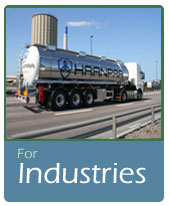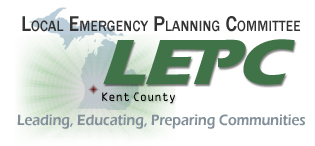Sheriff's Office
LEPC - Safety Information for Industries
 Industry | Small Businesses
Industry | Small Businesses
Hazardous substances are not found only at large chemical plants and refineries. They are also used by food
processors and distributors, most of whom have refrigeration systems, by water treatment and sewage treatment
plants, and by many small operations such as garages and dry cleaners. Even if these chemicals are handled and used
safely, they may be of concern if stored or used improperly, or during an emergency such as a fire.
Facilities should review environmental data to determine which chemicals are being used in the immediate area. Even
if a business does not handle any chemicals, it should be aware of any nearby facilities that are handling hazardous
chemicals. A release of these chemicals could affect the business's workers, customers, and property.
Industry
Does your facility fall into the regulations are you in compliance?
Michigan Department of Environment, Great Lakes and Energy (EGLE) – Community Right to Know goes to general DEQ. This site provides information on the SARA Title II regulation including filling Tier II and Section 302 reports as well as a link to Tier II Manager.
Emergency Requirements & Title III
The "Michigan Facilities' Guide to SARA Title III, Emergency Planning and Release Reporting" is a publication of the Michigan SARA Title III Program in the Michigan Department of Environment, Great Lakes and Energy.
SARA Title III Emergency Planning & Notification
United States Environmental Protection Agency - Information on the Emergency Planning and Community Right to Know Act (EPCRA/SARA Title III)
Toxics Release Inventory
The Pollution Prevention Act (PPA) of 1990 mandates collection of data on toxic chemicals that are treated, recycled,
and combusted
for energy recovery. This law requires facilities in certain industries, which manufacture, process, or use toxic
chemicals above
specified amounts, to report annually on disposal or other releases and other waste management activities related to
these
chemicals. The U.S. Environmental Protection Agency (EPA) maintains this information in a national database
called the Toxics Release Inventory.
Michigan State Police-Emergency Management and Homeland Security Division - Information on offsite response planning, training opportunities, NIMS and LEPCs.
October 9, 2009: Emergency Plan Development Training - Review the LEPC Annual meeting workshop presentation in PDF format or PowerPoint format.
NIMS - Information on the National Incident Management System
Small Businesses
CDC - Management Planning Guides

www.accesskent.com/lepc | (616) 632-6256
